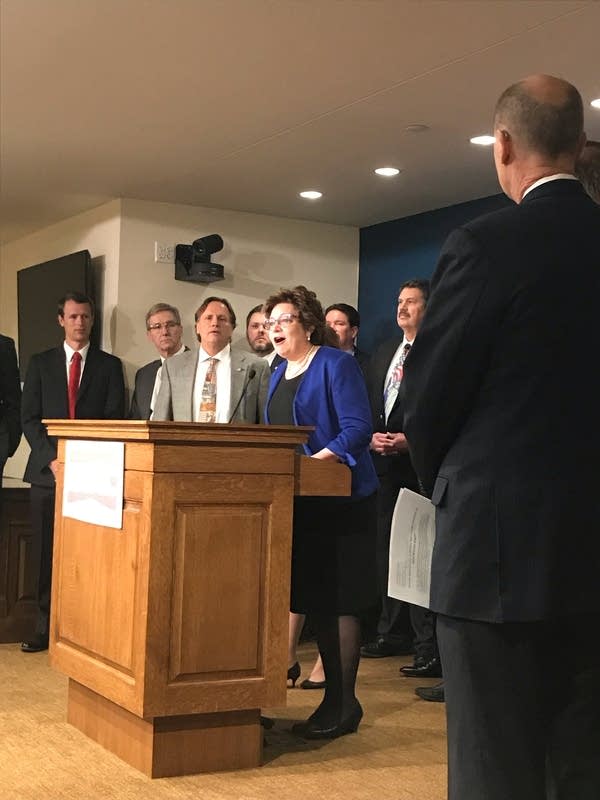4 ways Minnesota lawmakers hope to boost education

Go Deeper.
Create an account or log in to save stories.
Like this?
Thanks for liking this story! We have added it to a list of your favorite stories.
Minnesota lawmakers with teaching experience will play a big role this year shaping education legislation at the Capitol. That includes Gov. Tim Walz and key members of the House and Senate.
Republican and Democratic lawmakers put forward a host of education bills in the past two weeks that they hope to turn into law this session. Here are their top four issues:
1) School safety
Turn Up Your Support
MPR News helps you turn down the noise and build shared understanding. Turn up your support for this public resource and keep trusted journalism accessible to all.
DFL and GOP lawmakers say they're concerned about school safety, but the two parties have different approaches to the issue.

Republican senators are seeking money for school security upgrades as well as school mental health and security workers. The provisions were part of a supplemental budget bill that passed the Legislature last year, but were vetoed by then-Gov. Mark Dayton,, who said the bill was loaded with objectionable policy.
The GOP school plan "has a significant amount of mental health services early on for our kids. School-linked mental health grants can help prevent some of the tragedies that we see with untreated mental health," said Senate E-12 Finance and Policy Committee Chair Carla Nelson, R-Rochester.
DFL lawmakers say they also support paying for school security upgrades. In addition, state Rep. Jim Davnie, DFL-Minneapolis, chair of the House Education Finance Division, said he wants to pass "red flag laws" that allow a court to temporarily keep a person deemed to be a threat to themselves or others from accessing guns.
Democrats tried to pass gun restriction bills last year, but Republican lawmakers stopped the bills from moving forward.
"Minnesota was very frustrated last year when the GOP leadership refused to move forward on gun violence prevention. It was one of a number of issues where we had bipartisan legislative support to move forward. And we had broad public support to move forward. And the legislative leadership refused," Davnie said. "Minnesota wants action on gun violence prevention."
2) Community schools
DFL legislators want to fund mental health support for Minnesota students within the framework of community schools, a model that aims to bring social services into public schools to help students and their families.
"By funding school-linked mental health programs and school-support professionals, we ensure that students have access to the supports they need to succeed," said Rep. Heather Edelson, DFL-Edina. "By funding full-service community schools, we ensure that school communities can build the sort of partnerships they needed for schools and families to thrive."
Walz has talked about community schools as well. "Full-service community schools are a proven way that we can make real progress on reducing achievement and learning gaps," Walz wrote in his Tweet in October during his campaign.
3) Early education
Dayton championed universal pre-K education, and Walz made it part of his campaign platform.
Now, Democrats in the House are making early childhood education a top priority, backing legislation that would invest in prenatal care, home visiting for new parents and early development and care, especially for low-income children between at birth to age 3.
"We suffer from one of the largest opportunity gaps in the country, and this gap starts long before kindergarten," said state Rep. Carlie Kotyza-Witthuhn, DFL-Eden Prairie, chair of the House Early Childhood Finance and Policy Division.
Republicans, though, see universal pre-K as a threat to day care providers.
"If the state of Minnesota comes forward with universal pre-K for 4-year-olds, it will destroy the rest of what's left of our day care system," said state Sen. Bill Weber, R-Luverne.
Senate Republicans say they're focused on reducing the amount of paperwork day care providers are required to do and funding more childcare startups.
"Affordable, accessible childcare is something that is important to both families and communities. And I'm confident that we can get this done in a bipartisan way," said state Sen. Karin Housley, R-St. Mary's Point.
4) Special education
A bipartisan group of state senators is proposing legislation aimed at reducing the amount of paperwork special education teachers are required to do.
"Over 50 percent of a teacher's time can be taken up with paperwork and mandated procedures," said state Sen. Eric Pratt, R-Prior Lake. "The process has become so complex that we're taking away valuable time, teacher time, from that student."


